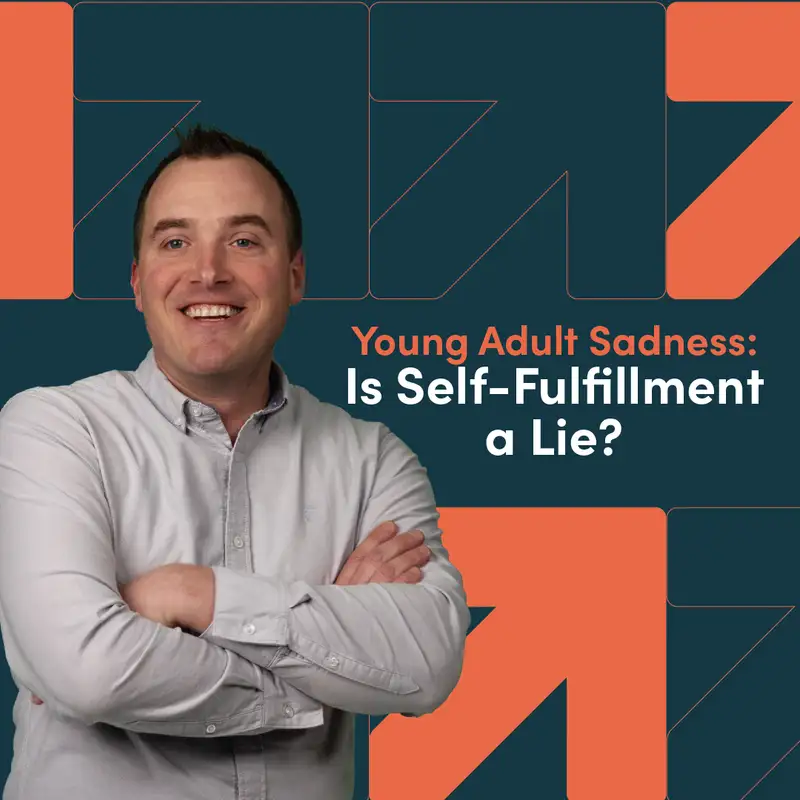Young Adult Sadness: Is Self-Fulfillment a Lie?
Hello, everyone. Thanks for listening to Wake Up, Look Up, a podcast where we connect events happening in real time to the gospel of Jesus Christ. I'm Zach Weihrauch. And in today's episode, we're talking about young adult sadness. We're asking the question, is self fulfillment a lie?
This is prompted by a really interesting article I read in the New York Times about a study, a global study, on human flourishing, particularly among young adults. The logic of anthropology over hundred years has been that life's happiness is kind of a u shape. Meaning, when you're young, you're happy. In midlife, your happiness dips a little, and then it comes back up in old age where, hopefully, you're, a little more laid back and a little more enjoying the fruit of your labor of a lifetime of working. And so that u shape is the normal way of thinking about happiness.
But what we're finding is that increasingly, people in their early twenties, people in that kind of 18 20 nine age range, a time historically where you would be very happy are actually not that happy. That u shape is flattening. Now whenever I read a study like this, I'm always paying attention to how many people did they talk to, where do those people live, you you know, is it a robust enough sample size? But in this particular study, the answer is overwhelmingly yes. They talked to over 200,000 people in that eighteen to twenty nine age range, and those people came from over 20 different countries.
So this really is a global phenomena. Young people around the world are more unhappy today than really they've been in the last hundred years, and that's especially true, by the way, in The US. The numbers across the globe show a decline in happiness, but it is most punctuated in The United States. Now when they ask eighteen to twenty nine year olds, why are you unhappy, the causes they give are pretty interesting. They cite things like perfectionism, isolation, anxiety, disconnection, a lack of community.
All these things are pretty common among the young people that are not happy, and they talk a lot about screens and and replacing actual human interaction. Now none of this should be surprising. We we cover these kinds of stories all the time on wake up, look up, but I wanna take a little bit of a different angle because I don't actually think the enemy in this story are screens. I think the enemy in this story is the whole concept of self fulfillment. Now we've been told for some time that we have a hierarchy of needs.
This comes from Abraham Maslow's work and that the pinnacle of our hierarchy is self actualization, that a truly fulfilling life is a life where we become in tune with, comfortable with, and even proud of ourselves. And as a result, that's the kind of life we live. We pursue our dreams, our visions, our goals, our plan because we're chasing self actualization. But it doesn't work. I mean, these kids in this age range, they grew up in that culture.
They've bought that lie, but it isn't working for them. And, of course, that shouldn't be surprising if you've read the Bible because God warns us about that. Jesus says it this way. This is a beautifully simple way of saying it. Whoever wants to gain his life will lose it.
Whoever loses his life will gain it. Jesus is saying that if you make yourself the center of your universe, your universe will gradually implode upon itself. You need a higher calling. And, of course, that's what Jesus came to give through his life, death, resurrection, and his kingdom that he's building. Isolation, which, of course, is what happens not just when we have screens, but when everyone in the room is chasing their own self actualization, is untethering humans not just from each other, but from our actual meaning and purpose in life.
Don't forget that in Genesis two, God looks at Adam and says, it's not good that he be alone. We are made in the image of a triune God, a God in community, and lives of isolation will always lead to us withering. The truth is that achievement, self actualization is a fleeting goal. It's only as big as my life, which in the grand scheme of things isn't very big, and I live with that. I know that.
So it creates this existential angst. That's why in first Peter two, Peter is calling us as Christians to a bigger goal. We are a chosen people, a holy race, a priesthood of believers that God wants to use to spread the gospel around the world. Jesus said it this way. I've come so that you might have life and life more abundant.
That's the gospel of John chapter 10. And he didn't mean that I came to help you achieve self actualization. He meant I came to rescue you from the banality of self fulfillment to make you a part of a kingdom that God is building. If we wanna help young people, we do so by calling them to something greater than themselves, calling them to community, calling them to neighbor love, calling them to experience the radical love of God that is available in Jesus, and then to get busy joining Jesus in making all things new. Listen, if you're a young person listening to this and you felt unhappy recent recently, turn away from a culture of selfishness.
That is not what leads to fulfillment. Instead, surrender your life to Jesus by losing the life of self fulfillment. You might just gain your own soul. Hey. Thanks for watching this episode of Wake Up, Look Up.
If you enjoyed it, please help us get the word out by sharing it with someone you think might benefit from it. And while you're here, make sure to subscribe to our YouTube channel to get further content or even download the CCC app where you'll find even more resources to help you grow in your faith and relationship with Jesus Christ.
Have an article you’d like Pastor Zach to discuss? Email us at wakeup@ccchapel.com!
Creators and Guests


